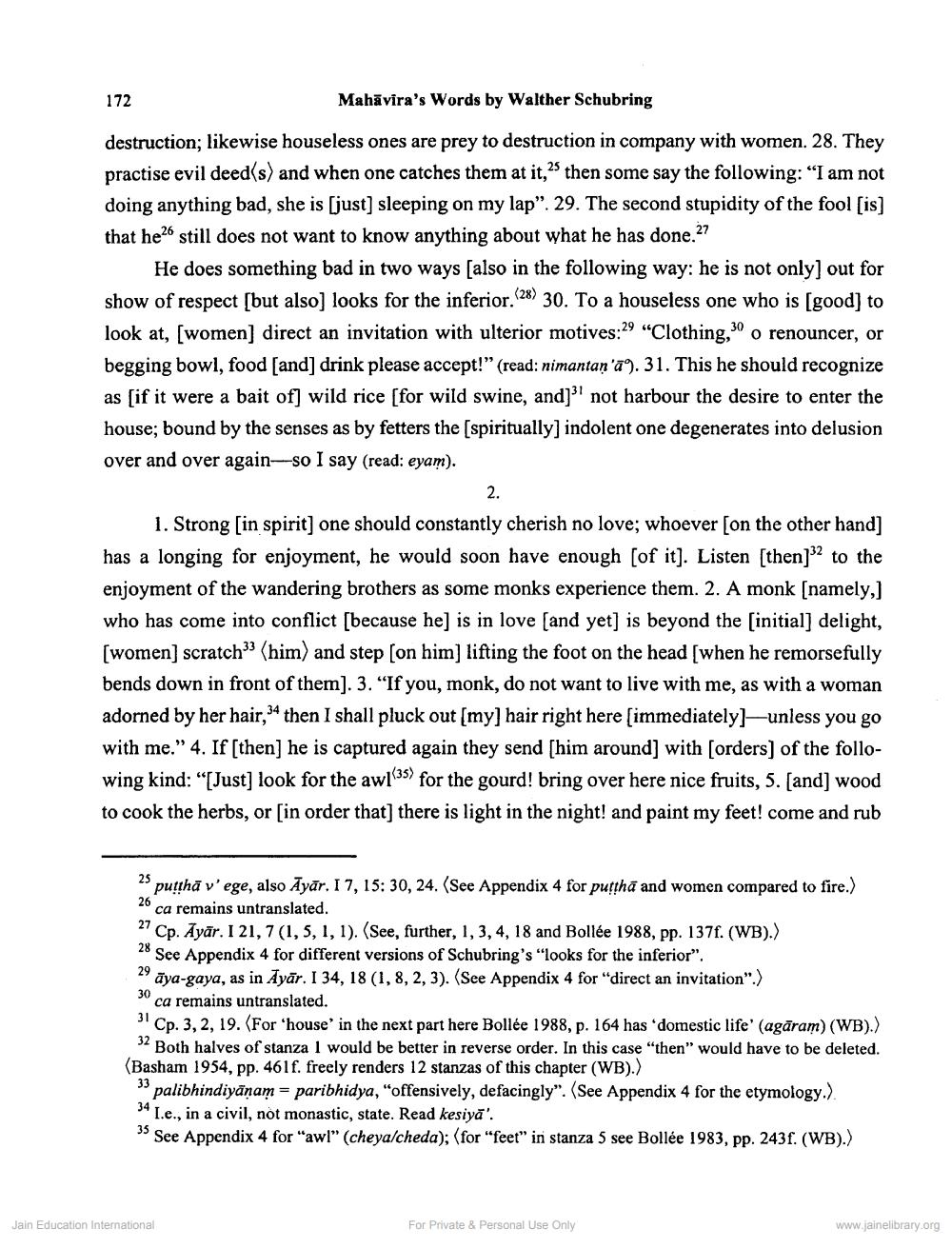________________
172
Mahāvira's Words by Walther Schubring
destruction; likewise houseless ones are prey to destruction in company with women. 28. They practise evil deed(s) and when one catches them at it, then some say the following: “I am not doing anything bad, she is (just) sleeping on my lap". 29. The second stupidity of the fool [is] that he26 still does not want to know anything about what he has done.27
He does something bad in two ways [also in the following way: he is not only) out for show of respect [but also] looks for the inferior. 28) 30. To a houseless one who is (good) to look at, (women) direct an invitation with ulterior motives:29 "Clothing, 30 o renouncer, or begging bowl, food [and] drink please accept!" (read: nimantan'a9. 31. This he should recognize as [if it were a bait of] wild rice (for wild swine, and}}' not harbour the desire to enter the house; bound by the senses as by fetters the [spiritually] indolent one degenerates into delusion over and over again—so I say (read: eyam).
2.
1. Strong (in spirit) one should constantly cherish no love; whoever (on the other hand] has a longing for enjoyment, he would soon have enough (of it). Listen (then]2 to the enjoyment of the wandering brothers as some monks experience them. 2. A monk (namely,] who has come into conflict [because he) is in love (and yet) is beyond the [initial] delight, (women) scratch" (him) and step (on him) lifting the foot on the head [when he remorsefully bends down in front of them). 3. “If you, monk, do not want to live with me, as with a woman adorned by her hair, 34 then I shall pluck out (my) hair right here (immediately]—unless you go with me." 4. If [then] he is captured again they send [him around) with [orders) of the following kind: “[Just] look for the awl(s) for the gourd! bring over here nice fruits, 5. [and] wood to cook the herbs, or [in order that) there is light in the night! and paint my feet! come and rub
putthā v'ege, also Āyār. 17, 15:30, 24. (See Appendix 4 for putthā and women compared to fire.) 26 ca remains untranslated. 27 Cp. Ayār. I 21, 7(1, 5, 1, 1). (See, further, 1, 3, 4, 18 and Bollée 1988, pp. 137f. (WB).) 28 See Appendix 4 for different versions of Schubring's "looks for the inferior". - āya-gaya, as in Ayār. I 34, 18 (1, 8, 2, 3). (See Appendix 4 for "direct an invitation".) 30 ca remains untranslated.
Cp. 3, 2, 19. (For 'house' in the next part here Bollée 1988, p. 164 has domestic life' (agāram) (WB).) 32 Both halves of stanza 1 would be better in reverse order. In this case "then" would have to be deleted. (Basham 1954, pp. 461f. freely renders 12 stanzas of this chapter (WB).) spalibhindiyānam = paribhidya, "offensively, defacingly". (See Appendix 4 for the etymology.). S4 I.e., in a civil, not monastic, state. Read kesiya'. » See Appendix 4 for “awl" (cheya/cheda); (for "feet" in stanza 5 see Bollée 1983, pp. 243f. (WB).)
Jain Education International
For Private & Personal Use Only
www.jainelibrary.org




